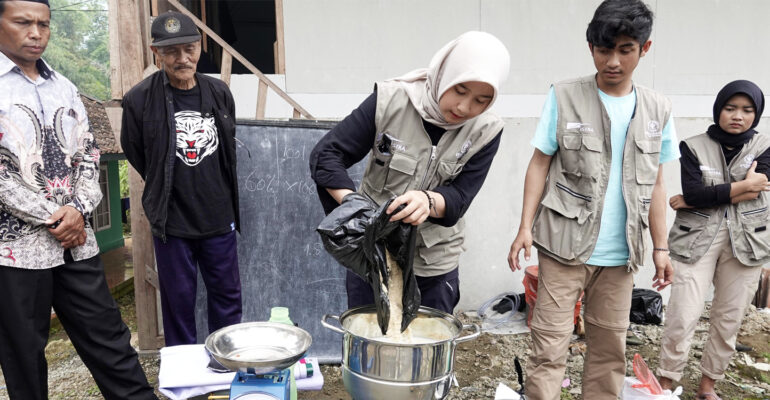Improve the Skills of Local Farmers, IPB University Gives Bioenzyme and MOL Organic Agricultural Input Training

IPB University together with Freedom of Learning – Independence Campus (MBKM) Hutan Karbon Produktif-Kedaireka intern students carried out socialisation activities and organic agricultural input training with the topic of using bioenzymes and local microorganisms (MOL).
The training was held in Karangjaya Village, Pasir Kuda District, Cianjur Regency, West Java. This activity is carried out by involving the active role of local farmers.
Bioenzyme is one of the many types of organic fertilisers that can be used on cultivated land. Bioenzymes are organic-based products produced through the fermentation of natural ingredients.
Just like bioenzyme, MOL is also made from natural ingredients. What makes it different, MOL is a liquid mixture that contains microorganisms, which can be useful as a starter.
In the middle of the presentation session of the benefits to the content in bioenzymes and MOL, Ir Wahyu Purwakusuma, MSc as a speaker showed to the farmers the results of bioenzymes that he had previously made. The farmers tried to see and smell one by one and describe the materials used.
“It’s like using yeast, the smell is distinctive but never smelling,” said one of the participants.
“Yes, that’s right, the smell is characteristic like tape, but no yeast is added to bioenzymes, so it comes from the peel of the fruit. The ingredients are enough for fruit peel, brown sugar, and water,” said Ir Wahyu Purwakusuma, MSc, lecturer at IPB University in the Department of Soil Science and Land Resources, Faculty of Agriculture.
The material presentation session was accompled with questions and answers and discussions. The farmers who were present participated actively and enthusiastically gave questions and shared their experiences.
“Because when I buy fertiliser, the funds are limited, so it’s good to have training in the field of organic fertilisers like this. Earlier the banana peel can be used as organic material, for the branches and stems can it also not be used as organic fertiliser?” Asked Nanang, one of the participants.
“Related to organic raw materials can be anything. As for making organic fertiliser, compost can use any type of organic material, but which is relatively easy to decompose or digest. When making compost, it is better to bend it dry,” answered Ir Wahyu Purwakusuma, MSc.
“Except for the manufacture of bioenzymes, it can only be certain materials, such as fruit peels that contain high water content,” he continued.
Furthermore, all participants participated in a demonstration of how to make bioenzymes and MOL. The demonstration was accompanied by MBKM students of Hutan Karbon Produktif-Kedaireka.
The ingredients used to make bioenzymes and MOL are quite easy to get. The way to make it is also easy to do. Some participants listened carefully, some others also participated in trying to make bioenzymes and MOL.
“Alhamdulillah thanks to IPB University who has shared knowledge in fertilisation, especially related to how to make MOL and bioenzymes that we can make ourselves with materials that are easy to find in our surroundings. Hopefully we can use it in our area and make agriculture and plantations in our area fertile,” said Nurhalimah, one of the residents of the training. (*/Rz) (IAAS/IAN)



